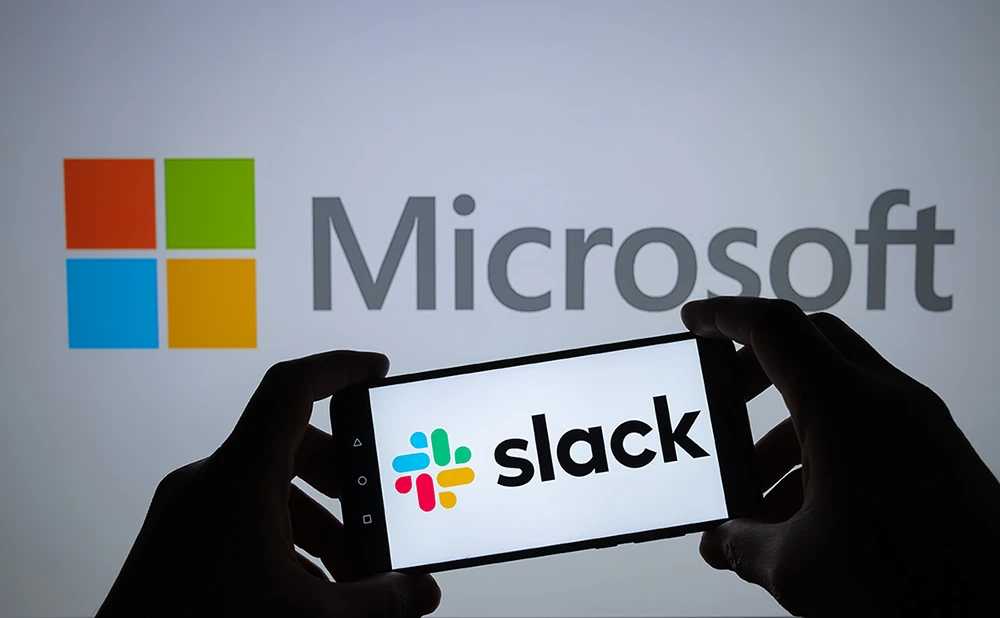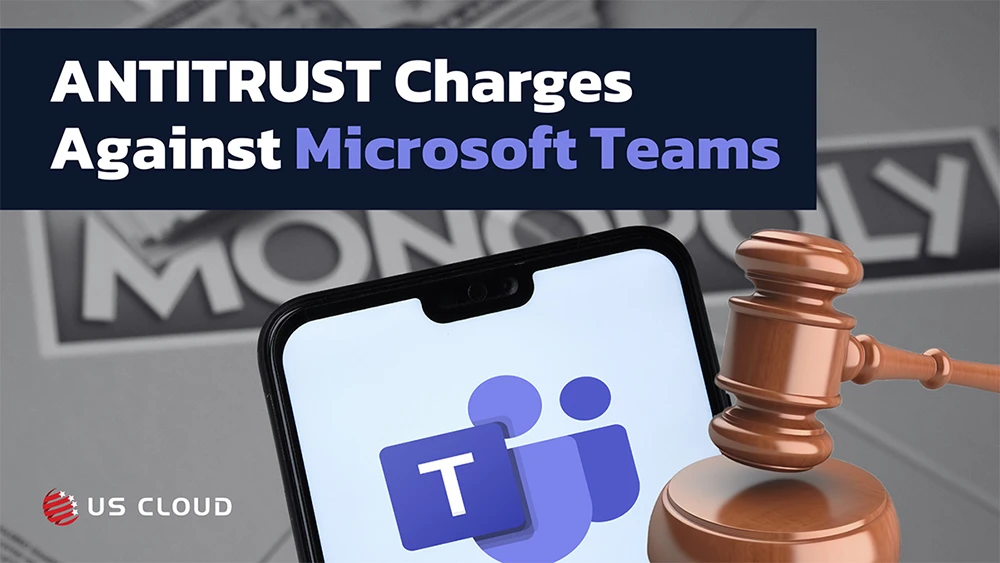
5 Key Facts About the Microsoft Teams Antitrust Case.

EU Charges, Market Dominance, and Potential Consequences
The Microsoft Teams antitrust case has become a significant focal point in the tech industry, highlighting ongoing concerns about market dominance and fair competition in the digital age. Here are the top 5 facts you need to know about this case:
1. EU Antitrust Charges Against Microsoft
EU Antitrust Charges Against Microsoft The European Commission has leveled significant antitrust charges against Microsoft, alleging that the company illegally bundled its Teams chat and video app with Office 365 and Microsoft 365 suites. This practice is accused of giving Teams an unfair distribution advantage, potentially stifling competition and innovation in the communication and collaboration software market.
2. Origin of the Complaint and Market Dominance
Origin of the Complaint and Market Dominance The investigation was triggered by a 2020 complaint from Slack, now owned by Salesforce. Slack argued that Microsoft was “force installing” Teams for millions of users, making it difficult to remove. This complaint underscores Microsoft’s dominant position in the productivity software market.

3. Microsoft’s Response and Attempted Remedies
In response to these allegations, Microsoft has taken steps to address the concerns:
- Unbundling Teams from its Office products in Europe and globally
- Offering Teams as a standalone product separate from its Office suite worldwide
- Expressing willingness to work with regulators to find additional solutions
Despite these efforts, the European Commission has deemed these changes insufficient to fully address the competition concerns.
4. Potential Consequences for Microsoft
If found guilty of antitrust violations, Microsoft could face significant consequences:
- Fines of up to 10% of its global annual revenue, potentially amounting to billions of dollars
- Required changes to business practices, including further separation of Teams from Office suites
- Mandated improvements in interoperability between Microsoft’s products and competitors
- Potential reputational impact and increased regulatory scrutiny
5. Broader Implications for the Tech Industry
The outcome of this case could have far-reaching implications for the tech industry:
- Setting precedents for how large tech companies bundle their services and compete in the digital marketplace
- Influencing regulatory approaches in other jurisdictions, potentially affecting global strategies of tech giants
- Emphasizing the balance between fostering innovation and ensuring fair competition in rapidly evolving tech sectors
- Potentially reshaping the collaboration software market and encouraging new models of innovation that don’t rely on leveraging existing market dominance
This case exemplifies the ongoing challenges in regulating the tech industry and highlights the differing approaches between EU and US regulators. As the situation develops, it will undoubtedly continue to shape the landscape of digital competition and innovation.
The Rise of Teams and Microsoft's Antitrust Challenges
Microsoft’s current antitrust challenges with Teams are deeply rooted in its dominant market position and history of similar issues. This background provides context for the ongoing situation.
Market Dominance
Microsoft holds a commanding position in the productivity software market:
- In the U.S. government sector, Microsoft’s market share is approximately 85%, dwarfing its nearest competitor by more than seven times (Omdia, 2021).
- Globally, Microsoft 365 controls over 45% of the market share for major office suite technologies.
Teams’ Explosive Growth
Microsoft Teams user base skyrocketed during the pandemic era.
| Sector | Market Share |
|---|---|
| U.S. government office productivity software | ~85% |
| Global major office suite technologies | >45% |
Teams’ Explosive Growth
The COVID-19 pandemic catalyzed an unprecedented adoption of Teams:
- Pre-pandemic (2019): ~20 million Teams users
- By 2023: 300 million Teams users
This growth was primarily driven by the global shift to remote work, which made collaboration tools essential for businesses.
Microsoft’s Market Dominance
| Year | Number of Teams Users |
|---|---|
| 2019 | ~20 million |
| 2023 | ~300 million |
| Microsoft’s commanding position in key software markets. | |
Antitrust History
Microsoft is no stranger to antitrust scrutiny:
- 2001: U.S. antitrust case over Internet Explorer bundling, resulting in Microsoft agreeing to modify certain business practices.
- 2013: €561 million fine from the European Commission for not promoting alternatives to Internet Explorer.
Current Antitrust Charges
The European Commission alleges that Microsoft is:
- Illegally bundling Teams with Office 365 and Microsoft 365 suites
- Giving Teams an unfair “distribution advantage”
- Potentially preventing rivals from competing and innovating
Microsoft’s Response
To address these concerns, Microsoft has:
- Unbundled Teams from its Office products in Europe and globally
- However, the European Commission deemed these changes insufficient
The outcome of this case could significantly impact Microsoft and set precedents for how large tech companies bundle services and compete in the digital marketplace.
The European Commission's Case Against Microsoft Teams
In a move that has sent ripples through the tech industry, the European Commission has leveled serious allegations against Microsoft regarding its Teams platform and Microsoft 365 suite. At the heart of the matter is a practice that has long been a cornerstone of Microsoft’s strategy: bundling.

The Commission argues that Microsoft has illegally bundled its Teams chat and video app with Office 365 and Microsoft 365 suites. This isn’t just about packaging products together; in the Commission’s view, it’s about giving Teams an unfair “distribution advantage” in a highly competitive market.
The concern is that this practice doesn’t just benefit Microsoft—it actively harms its competitors and stifles innovation in the communication and collaboration software market.
Companies like Slack and other video conferencing providers are feeling the squeeze. The Commission believes that Microsoft’s bundling tactics have effectively prevented these rivals from competing on a level playing field. It’s not just about market share; it’s about the future of innovation in this crucial sector.
Key allegations:
- Abuse of dominant market position
- Violation of Article 102 of the Treaty on the Functioning of the European Union
- Limited interoperability with competitors’ products
Microsoft hasn’t been sitting idle in the face of these allegations. The company has made attempts to address the concerns, including unbundling Teams from Office in Europe. However, in the Commission’s eyes, these changes are too little, too late. They’ve deemed Microsoft’s efforts “insufficient” to restore true competition in the market.
If these allegations are proven, the consequences for Microsoft could be severe:
- Fines up to 10% of global annual revenue
- Required changes to business practices
- Potential reshaping of strategy in the collaboration software market
As this case unfolds, it’s clear that the implications extend far beyond Microsoft. The outcome could set precedents for how tech companies bundle and distribute their services, potentially reshaping the landscape of digital competition for years to come.

Microsoft's Dance with Regulators: Responding to Teams Antitrust Allegations

In the face of mounting antitrust pressure, Microsoft has been quick to adapt, showing a willingness to change that might surprise some industry watchers. The tech giant’s response to allegations about its Teams platform has been nothing short of a corporate tango, with steps forward, back, and to the side as it tries to find its footing in a changing regulatory landscape.
Microsoft’s response has unfolded in several key moves:
- August 2023: Announced the sale of Office without Teams in Europe
- Early 2024: Began unbundling Teams from Office 365 and Microsoft 365 suites in Europe
- April 2024: Extended the unbundling globally, offering Teams as a standalone product worldwide
These weren’t just small tweaks; they represented a significant shift in Microsoft’s long-standing strategy of bundling its products. For customers in the European Economic Area and Switzerland, and later globally, this meant a new choice: Office without Teams, an option previously unavailable.
Despite these significant changes, the European Commission wasn’t entirely satisfied, deeming the moves “insufficient” to address all their concerns. It was a moment that could have led to confrontation, but Microsoft chose a different path.
Brad Smith, Microsoft’s Vice Chair and President, extended an olive branch:
“Having unbundled Teams and taken initial interoperability steps, we appreciate the additional clarity provided today and will work to find solutions to address the Commission’s remaining concerns,”
—Brad Smith, Microsoft’s Vice Chair and President
It was a clear signal: Microsoft was ready to keep dancing. This openness to further change is perhaps the most striking aspect of Microsoft’s response.
The company has shown a willingness to:
- Acknowledge the need for additional adjustments
- Work with regulators to find more solutions
- Maintain an open dialogue with the European Commission
- Commit to resolving the issue rather than fighting allegations outright
Throughout this process, Microsoft has maintained an open dialogue with the European Commission. Rather than digging in its heels and fighting the allegations outright, the company has shown a commitment to finding a resolution. It’s a strategy that speaks volumes about how Microsoft views its relationship with regulators in today’s tech landscape.
In the end, Microsoft’s response to the Teams antitrust allegations tells a story of a company willing to adapt. From unbundling products to global policy changes, from public statements to behind-the-scenes dialogues, Microsoft is showing a flexibility that may well set a new standard for how tech giants respond to antitrust concerns. As the dance continues, all eyes will be on Microsoft to see what steps it takes next.
The Ripple Effect: Microsoft Teams Antitrust Case and Its Far-Reaching Consequences
The Microsoft Teams antitrust case isn’t just a legal battle; it’s a seismic event sending shockwaves through the tech industry. From scrappy startups to tech giants, everyone’s feeling the tremors. Let’s dive into the impact on competitors and the potential consequences Microsoft faces.
David vs. Goliath: Competitors Take a Stand
It all started with Slack. In 2020, the plucky communication platform threw down the gauntlet, accusing Microsoft of “force installing” Teams and making it a pain to remove. This David vs. Goliath moment caught the European Commission’s attention, kickstarting the investigation we’re watching unfold today.
But Slack isn’t the only player in this game. Despite Teams’ meteoric rise, other collaboration tools are holding their ground:
- Zoom continues to dominate video conferencing in many European markets.
- Google Meet maintains a strong presence, even outperforming Teams in some areas.
- Slack, now under Salesforce’s wing, remains a formidable competitor.
The pandemic was a double-edged sword for these companies. While it catapulted Teams from 20 million users in 2019 to a whopping 300 million by 2023, it also supercharged the entire collaboration tools market. The pie got bigger, and everyone’s slice grew.
However, it’s not all rosy in the garden of digital collaboration. The European Commission has raised red flags about interoperability issues between Microsoft’s products and its competitors. It’s like everyone’s invited to the party, but some guests are struggling to get through the door.
The Price of Success: Potential Consequences for Microsoft

Now, let’s talk about the elephant in the room: what happens if Microsoft is found guilty? The consequences could be far-reaching and potentially game-changing for the tech giant:
- Financial Hit: Microsoft could be slapped with fines up to 10% of its global annual revenue. With 2022 revenue hitting $211 billion, we’re talking potential billions in fines.
- Business Shake-up: Microsoft might need to:
- Further unbundle Teams from Office 365 and Microsoft 365
- Adjust pricing, potentially selling Office without Teams at a reduced price
- Improve interoperability with competing products
- Change how it distributes Teams, giving customers more explicit choices
- Reputation Management: This case could reinforce perceptions of anti-competitive behavior, potentially affecting customer and investor confidence.
- Increased Scrutiny: Success often comes with a spotlight, and this case might intensify regulatory attention on Microsoft’s other practices, including its ventures into AI.
- Industry-wide Ripples: The outcome could set precedents for how big tech companies bundle and distribute services, potentially reshaping strategies across the industry.
Collaboration Tools Price War
| Tool | Price (per user/month) |
|---|---|
| Teams | $5.25 |
| Slack Pro | $7.25 |
| Zoom Pro | $13.33 |
| Standalone Teams pricing puts pressure on competitors. | |
In the end, this isn’t just about Teams or Microsoft. It’s about the future of digital collaboration, fair competition, and the delicate dance between innovation and regulation. As the case unfolds, one thing’s for sure: the tech world is watching, and the aftershocks of this antitrust earthquake will be felt for years to come.
Beyond Teams: The Far-Reaching Implications of Microsoft's Antitrust Battle
The Microsoft Teams antitrust case isn’t just about one company or one product. It’s a crystal ball, offering us a glimpse into the future of tech regulation and competition. As this legal drama unfolds, it’s sending ripples across the entire tech industry, from Silicon Valley to startup garages worldwide.
A New Playbook for Tech Giants
First and foremost, this case could rewrite the rulebook for how big tech operates. Apple, Google, Amazon – they’re all watching closely. Why? Because the outcome could set precedents for how large tech companies bundle their services and compete in the digital marketplace.
The core question at stake is this: How do we balance innovation with fair competition? It’s a tightrope walk that regulators are attempting, trying to maintain a competitive landscape without putting the brakes on technological advancements.
The Bundling Dilemma
The Teams case has put a spotlight on a common practice in the tech world: bundling. It’s like getting fries with your burger – seems great, right? But what if you’re a salad seller trying to compete with the burger joint?
This scrutiny could lead to a domino effect across the industry:
- Companies may need to rethink how they package and offer their services
- We might see more ‘unbundling’ of services industry-wide
- Tech giants may need to tread more carefully when leveraging their dominance in one area to gain advantage in another
The Interoperability Imperative
Another key issue the case brings to the fore is interoperability. The EU’s emphasis on this could lead to increased pressure on tech companies to ensure their products play nice with competitors’ offerings. Imagine a world where all your apps and services work seamlessly together, regardless of who made them. That’s the dream, anyway.
A Tale of Two Regulatory Approaches
The case also highlights a fascinating divide in how different regions approach tech regulation:
- The EU: Proactive and comprehensive, with broad regulations and hefty penalties
- The US: More reactive, relying on existing antitrust laws and case-by-case enforcement
Regulatory Divide: EU vs. US
| Aspect | EU Approach | US Approach |
|---|---|---|
| Strategy | Proactive and comprehensive | Reactive, case-by-case |
| Scope | Broad regulations for digital services | Focused on specific sectors |
| Penalties | Up to 10% of global annual revenue | Varies, often based on consumer harm |
| Process | Commission-led investigations | Court-driven processes |
| Focus | Preventing market dominance abuse | Demonstrable consumer harm |
| Contrasting approaches to tech regulation across the Atlantic. | ||
This divergence could lead to tech companies adopting different strategies in different markets. It’s like playing chess on multiple boards simultaneously.
The Consumer’s Checkmate
At the heart of all this is the consumer. Regulators are increasingly focused on ensuring real choice in the digital marketplace. This could mean:
- Easier switching between services
- More options for alternative providers
- A push for tech companies to compete on individual product strengths rather than ecosystem lock-in
Innovation Reimagined
Perhaps most intriguingly, this scrutiny could spark new models of innovation. Tech companies might be pushed to think beyond leveraging their existing market dominance and instead focus on creating truly groundbreaking products and services.
The Business User’s Perspective
For enterprises and business users, the case presents a mixed bag:
Benefits of bundling:
- Integrated experience
- Cost-effectiveness
- Simplified procurement
Concerns with unbundling:
- Price increases
- Potential for forced adoption
- Interoperability issues
The unbundling of Teams offers more theoretical choice, but many businesses may find it challenging to move away from the Microsoft ecosystem. It’s a classic case of “easier said than done.”
As this legal saga continues to unfold, one thing is clear: the tech industry is entering a new era. An era where innovation must dance in step with fair competition, where global regulatory approaches clash and converge, and where the very nature of how tech products are created, bundled, and sold could be fundamentally reshaped.
The Microsoft Teams case isn’t just a legal battle – it’s a glimpse into the future of tech. And that future promises to be as complex, challenging, and fascinating as the industry itself.



